How to protect your skin when wearing a face mask
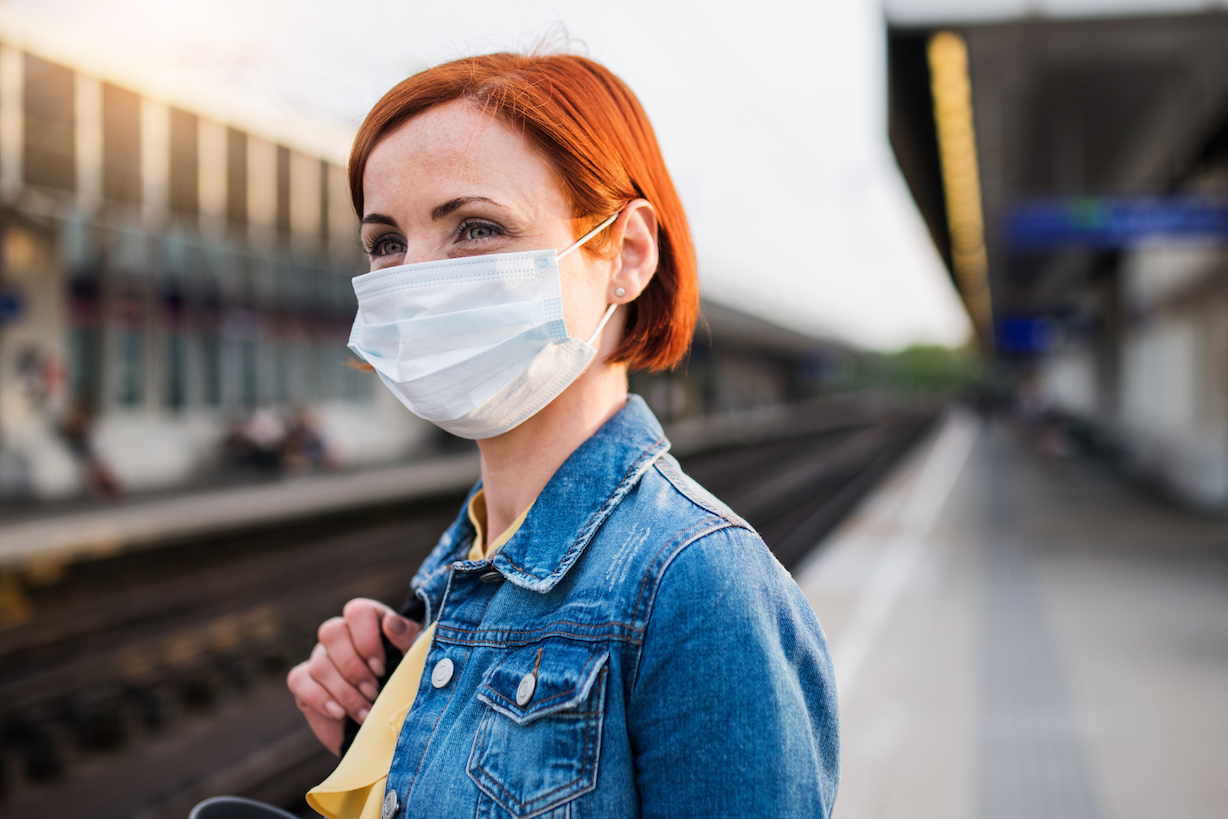

According to government guidance, we should all be wearing a face mask in indoor spaces where social distancing isn’t possible.
But what does that mean for the health of the section of skin we’re hiding away?
According to consultant dermatologist Dr Justine Hextall, wearing face masks for prolonged periods of time can have a knock-on effect on our complexions.
Here's how wearing a face mask can affect your skin and how to protect your skin when wearing one...
How can wearing a face mask affect your skin?
There are a variety of ways in which wearing a face mask can disrupt your skin. With everything from how long you’re wearing your mask for, to how you’re washing it and how tightly fitted it is can have an impact.
How face masks cause irritation
We’ve all seen the photos of our exhausted front-line staff sporting painful red marks across their faces. While this is in part due to their achingly long shifts, it’s also down to the close-fitting design of PPE masks.
Sign up to our free daily email for the latest royal and entertainment news, interesting opinion, expert advice on styling and beauty trends, and no-nonsense guides to the health and wellness questions you want answered.
According to Dr Justine, it doesn’t take long for skin to become irritated across pressure areas. The bony bits of our faces, like the nasal bridge and ears, where the skin is thinnest, tend to be the hardest hit.
Sadly, there isn’t much you can do to alleviate this. However Dr Justine advises that moisturising skin properly before applying your mask can go someway towards reducing irritation.
Different to PPE, fabric masks worn by the general public also have the potential to cause irritation.
To keep them sanitary, all face masks need to be put on a hot wash with a glug of strong detergent after use. This can lead to irritation or allergies, as we're not all used to having perfumed cleaning agents so close to the delicate skin on our faces. Making sure the detergent has been properly rinsed out will help.
How face masks cause breakouts
Rising temperatures and tight-fitting clothing are a recipe for breakouts, as oil and and bacteria become trapped in the gap between fabric and skin.
For the same reason experts recommend stripping off sweaty gym kit as soon as possible, don’t wear your mask for longer than necessary.
Washing your face regularly and using products containing pore-unplugging salicylic acid once the mask is off will help too.
How face masks can cause eczema
Wearing a mask will naturally warm up our skin, creating the kind of moist, snuggly environment that yeast thrives in.
According to Dr Justine, when yeast becomes more prevalent on the skin, the skin barrier is compromised, and we’re more likely to develop particular types of eczema.
This can exasperate existing inflammatory conditions like rosacea too.
Why is the skin barrier so important?
The main role of the skin barrier, as defined by Vichy Advising Dermatology Registrar Dr Mieran Sethi, is to prevent the entry of viruses and bacteria that can lead to inflammation. The barrier is also responsible for stopping water from escaping so skin stays elastic and supple, not dry and flaking.
The easiest way to picture the skin barrier is to think of it like a wall.
Natural lipids like ceramides act like mortar to hold the bricks, AKA our skin cells, together. When this mortar is compromised, external aggressors like pollution can sneak in, and water can get out.
Top tips for looking after your skin when wearing a face mask
Not sure if you need to adjust your routine to fit in with the ‘new normal’? Dr Justine shares her top tips on caring for your skin when you’re wearing a face mask, and they’re surprisingly straightforward.
- Wash your face with a nice, gentle cleanser. If your skin feels tight, it’s probably as you have disrupted the skin’s barrier and altered its PH.
- Look out for ingredients like humectants, glycerine, ceramides and hyaluronic acid within your cleanser and moisturiser. It’s really important to put these important elements back into your skin if you’ve washed them away.
- Cut back on actives like retinol and glycolic acid. Use them less regularly until your skin is feeling more comfortable, and counteract them with hydrating products when you do apply them.
- If you get a breakout or reaction, resist the temptation to change your routine. Instead, continue using gentle, hydrating products to repair the skin’s barrier.
Must-try skincare when you’re wearing a face mask
Cerave SA Smoothing Cleanser with Salicylic Acid
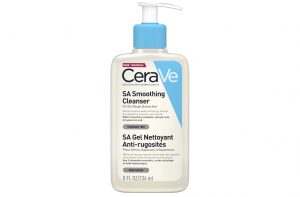
On the advice of Dr Registrar Dr Mieran Sethi, even if your skin is naturally oily, you should steer clear of cleansers that contain surfactants.
Not sure if your cleanser does? The easiest way to find out without labouring over the ingredients list is to see if it foams and bubbles when you use it.
This cleanser ticks all our boxes, containing 2% salicylic acid to deliver a deep clean, as well as ceramides and hyaluronic acid to replenish lost moisture.
SHOP NOW: Cerave SA Smoothing Cleanser with Salicylic Acid, £12, Boots
The Inkey List Oat Cleansing Balm
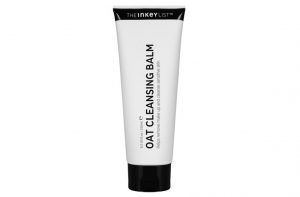
Gently does it when it comes to sensitive, stressed out skin, and this cleanser is as careful as they come.
Balm cleansers like this one are great for your first cleanse, whisking away daily grime, grease and gunk.
SHOP NOW: The Inkey List Oat Cleansing Balm, £9.99, Cult Beauty
La Roche-Posay Toleraine Ultra Dermallergo Serum
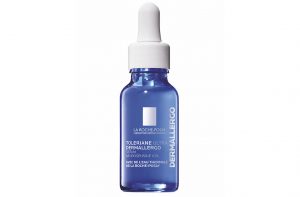
When your skin is sensitive to the point water makes it sting, there’s a temptation to skip products altogether.
Luckily, La Roche-Posay are pros when it comes to reducing redness, dryness and itching.
This serum hydrates skin for an impressive 48 hours, as well as repairing the skin barrier to reduce the chance of future reactions.
SHOP NOW: La Roche-Posay Toleraine Ultra Dermallergo Serum, £28, Boots
Vichy Mineral 89 Hyaluronic Acid Hydration Booster
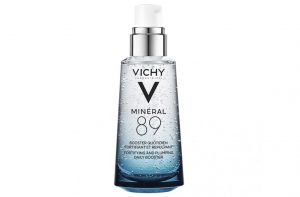
According to research from L’Oreal, the conversation about hydration has increased by +23% since the beginning of lockdown.
Plenty of thought has gone into this bottle of booster, using just 11 ingredients to leave skin soft, supple and most-importantly comfortable. Fragrance-free, it’s suitable for all skin types.
SHOP NOW: Vichy Mineral 89 Hyaluronic Acid Hydration Booster, £25, Look Fantastic
Kiehl’s Daily Refining Milk-Peel Toner
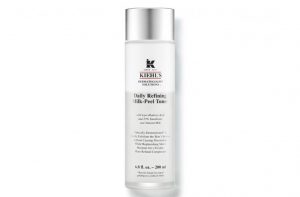
Following Dr Justine’s advice to cut back on harsh acids, this new launch is a great mild alternative.
Taking it’s inspiration from Korean clinic treatments, it combines lipo-hydroxy acid, which breaks down dead skin cells, with almond milk and emollients to refine and rehydrate.
SHOP NOW: Kiehl’s Daily Refining Milk-Peel Toner, £52, John Lewis
Just make sure to always your face masks when it's necessary - safety comes first!
Jess Beech is an experienced fashion and beauty editor, with more than eight years experience in the publishing industry. She has written for woman&home, GoodtoKnow, Now, Woman, Woman’s Weekly, Woman’s Own and Chat, and is a former Deputy Fashion & Beauty Editor at Future PLC. A beauty obsessive, Jess has tried everything from cryotherapy to chemical peels (minus the Samantha in Sex and The City-worthy redness) and interviewed experts including Jo Malone and Trinny Woodall.
